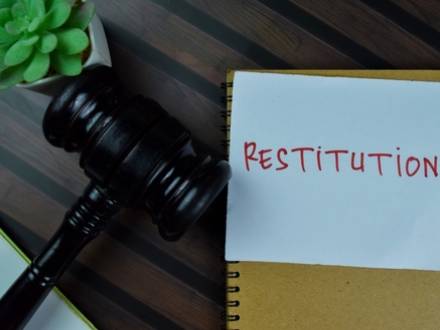How Restitution Can Affect People Convicted of Federal Crimes
 Most people are aware of certain consequences they could face if they are convicted of a crime, including a prison sentence, fines, and probation. However, people may be unaware of the possibility that they could be required to pay restitution, which is meant to compensate victims for the ways they were affected by criminal activity. Restitution is a common penalty for people who are convicted of federal crimes. However, the ways restitution is handled can be unjust, leaving people with financial burdens that may affect them for years or even the rest of their lives.
Most people are aware of certain consequences they could face if they are convicted of a crime, including a prison sentence, fines, and probation. However, people may be unaware of the possibility that they could be required to pay restitution, which is meant to compensate victims for the ways they were affected by criminal activity. Restitution is a common penalty for people who are convicted of federal crimes. However, the ways restitution is handled can be unjust, leaving people with financial burdens that may affect them for years or even the rest of their lives.
Criminal defendants will need to understand all of the potential consequences they may face if they are convicted. An experienced criminal defense lawyer can provide guidance on the potential penalties that may apply, and they can also advocate on behalf of a victim, working to reduce or eliminate certain penalties.
New Report Reveals Problems With How Restitution Is Handled in Federal Criminal Cases
The National Association of Criminal Defense Lawyers (NACDL) recently released a report detailing the ways federal laws implement restitution and how these laws often fail to provide justice. As the report notes, restitution is meant to serve a positive purpose: to address the harm suffered by victims due to crimes that have been committed. However, as is true for many of the actions the justice system takes against defendants, restitution more often serves as a way to punish people rather than providing benefits for victims.
In the average federal criminal case, the amount of restitution ordered is more than $3 million. This is far more than many defendants could ever be expected to pay. However, judges are prohibited from considering a person’s ability to pay when issuing restitution orders. As a result, many defendants are forced to remain in debt for decades or even the rest of their lives. While restitution obligations are outstanding, a person will continue to face many of the restrictions that come with a federal criminal conviction, which may include being unable to vote or possess firearms.
After being released from prison, a person’s wages will be garnished to pay restitution, and gifts or other monetary awards they receive may be intercepted. This can leave many defendants struggling to cover their ongoing expenses, compounding the difficulties that already exist because of a criminal record. Failure to pay restitution as required will lead to penalties, and interest also applies, causing debts to increase. Restitution obligations remain in place for 20 years after a judgment is entered or 20 years after their release from prison, whichever comes later. A person’s death will not terminate their restitution obligations, and their estate will be responsible for paying the outstanding debt.
At the same time, the restitution that is paid usually does not go to individual people who may have been affected by crimes. In 37 percent of federal criminal cases, the victim is a federal government agency. In other cases, victims may include state agencies, insurance companies, or corporations. If a victim declines restitution, the government will still collect the amount owed from the defendant, and the money will go to the U.S. Treasury.
As is true of other penalties issued by the federal government in criminal cases, restitution orders affect minorities disproportionately. In cases involving white collar crimes, around 42 percent of defendants who are convicted and required to pay restitution are Black, while around 34 percent are white. In many cases, restitution hearings are held separately from sentencing hearings, and defendants may not even be present at restitution hearings. In cases where multiple defendants are charged with the same crime, "joint and several liability" may require each defendant to pay the full amount of restitution to the victim. All of these factors can combine to result in unfair and unjust restitution requirements that only serve to increase and extend the punishments defendants may face.
Contact Our Connecticut Federal Criminal Defense Attorneys
People who are facing federal criminal charges will need to understand the potential impact of a conviction, including the restitution requirements that may apply. At Woolf & Ross Law Firm, LLC, our attorneys can help defend against convictions, and we can work to minimize the penalties that our clients may face while advocating for their rights. Contact our Hartford federal crimes defense lawyers at 860-290-8690 to set up a free consultation.






